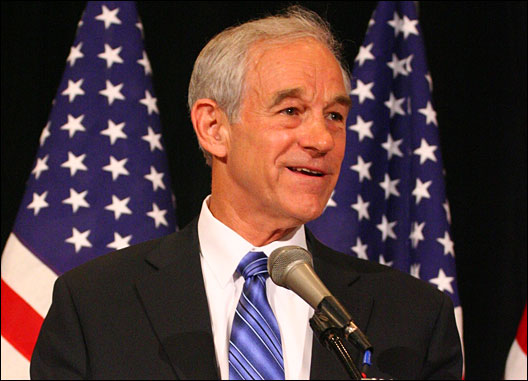Update: Ron Paul dropped out of the presidential race on June 12, 2008.

Republican presidential candidate Ron Paul doesn’t spend much time talking about the environment; when he does address the issue, it’s usually to say that our land, air, and water would be in better shape if the government butted out and let the free-market, private-property system run its course. Paul has represented Texas’s 14th district in the U.S. House of Representatives for the past decade, and he represented the 22nd district for about seven years in the ’70s and ’80s. In 1988, he ran for president as the Libertarian Party candidate. Paul’s lifetime voting score from the League of Conservation Voters is 29 percent.
Read an interview with Ron Paul by Grist and Outside.
Key Points
- Does not consider climate change a major issue and is not convinced that it is largely caused by human activity.
- Says he would end all subsidies and special benefits to energy companies.
- Has voted in favor of offshore drilling and drilling in the Arctic National Wildlife Refuge.
- Has consistently opposed farm subsidies.
Video
Watch Ron Paul answer a question about climate change at the Iowa Straw Poll on Aug. 11, 2007:
Watch a YouTube interview with Ron Paul; he addresses a question about the environment at 1:44:
Quotable Quotes
- “The freer the market is and the more respect you have for private property, the better the environment is protected.”
— July 13, 2007, in a YouTube interview
- “Fear is constantly generated by politicians to rally the support of the people. Environmentalists go back and forth, from warning about a coming ice age to arguing the grave dangers of global warming.”
— June 29, 2006, in a speech before the U.S. House of Representatives.
Platform & Record In-Depth
- Sponsor of the Affordable Gas Price Act, which would allow offshore drilling in U.S. waters, allow oil and gas drilling in the Arctic National Wildlife Refuge, exempt environmental impact statements conducted under the National Environmental Policy Act from judicial review, give more tax incentives for investing in oil refineries, and suspend the federal gasoline tax when retail gasoline prices hit $3 a gallon.
- Cosponsor of legislation that would streamline the federal approval process for oil refinery construction or expansion.
- Lead sponsor of the Industrial Hemp Farming Act of 2007, which would exclude industrial hemp from the definition of marijuana under the Controlled Substances Act.
- Cosponsor of legislation to make bicycle commuters eligible for the transportation fringe-benefit tax credit.
- Cosponsor of legislation that would provide a tax deduction for the costs of using public transit.
- Cosponsor of the Buildings for the 21st Century Act, which would increase the allowable tax deduction for energy-efficient commercial building costs and extend the deduction through 2013.
- Cosponsor of numerous bills giving or extending tax credits to various forms of renewable energy (in the 110th Congress, HR 197, HR 550, HR 1772, and HR 3107).
- Voted against the final version of the 2005 Energy Policy Act, a sweeping, oil-friendly energy bill opposed by enviros. The act passed and Bush signed it into law in August 2005.
- In 2002, voted against storing nuclear waste at the Yucca Mountain repository now being built in southern Nevada.
- In 2001, voted against raising fuel-economy standards for cars and light trucks to a combined average of 27.5 mpg for model years 2005 and 2006.
Still Haven’t Gotten Enough?
- Read Ron Paul’s official bio.
What did we miss? Tell us below in comments. We’ll update this page as the presidential campaign continues.
Todd Hymas Samkara contributed to this fact sheet.


